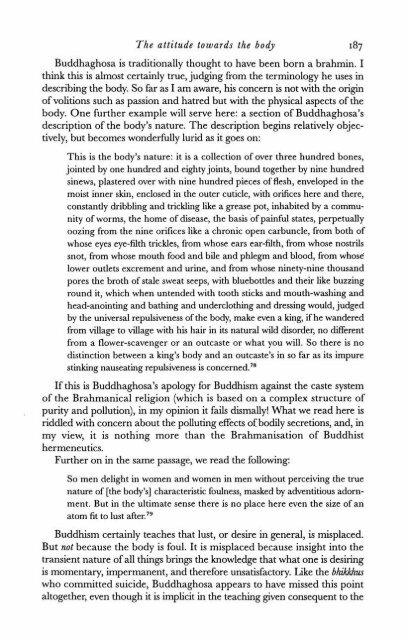Identity and Experience_Hamilton_1996
Identity and Experience_Hamilton_1996
Identity and Experience_Hamilton_1996
Create successful ePaper yourself
Turn your PDF publications into a flip-book with our unique Google optimized e-Paper software.
The attitude towards the body 187<br />
Buddhaghosa is traditionally thought to have been born a brahmin. I<br />
think this is almost certainly true, judging from the terminology he uses in<br />
describing the body. So far as I am aware, his concern is not with the origin<br />
of volitions such as passion <strong>and</strong> hatred but with the physical aspects of the<br />
body. One further example will serve here: a section of Buddhaghosa's<br />
description of the body's nature. The description begins relatively objectively,<br />
but becomes wonderfully lurid as it goes on:<br />
This is the body's nature: it is a collection of over three hundred bones,<br />
jointed by one hundred <strong>and</strong> eighty joints, bound together by nine hundred<br />
sinews, plastered over with nine hundred pieces of flesh, enveloped in the<br />
moist inner skin, enclosed in the outer cuticle, with orifices here <strong>and</strong> there,<br />
constantly dribbling <strong>and</strong> trickling like a grease pot, inhabited by a community<br />
of worms, the home of disease, the basis of painful states, perpetually<br />
oozing from the nine orifices like a chronic open carbuncle, from both of<br />
whose eyes eye-filth trickles, from whose ears ear-filth, from whose nostrils<br />
snot, from whose mouth food <strong>and</strong> bile <strong>and</strong> phlegm <strong>and</strong> blood, from whose'<br />
lower outlets excrement <strong>and</strong> urine, <strong>and</strong> from whose ninety-nine thous<strong>and</strong><br />
pores the broth of stale sweat seeps, with bluebottles <strong>and</strong> their like buzzing<br />
round it, which when untended with tooth sticks <strong>and</strong> mouth-washing <strong>and</strong><br />
head-anointing <strong>and</strong> bathing <strong>and</strong> underclothing <strong>and</strong> dressing would, judged<br />
by the universal repulsiveness of the body, make even a king, if he w<strong>and</strong>ered<br />
from village to village with his hair in its natural wild disorder, no different<br />
from a flower-scavenger or an outcaste or what you will. So there is no<br />
distinction between a king's body <strong>and</strong> an outcaste's in so far as its impure<br />
stinking nauseating repulsiveness is con~erned.'~<br />
If this is Buddhaghosa's apology for Buddhism against the caste system<br />
of the Brahmanical religion (which is based on a complex structure of<br />
purity <strong>and</strong> pollution), in my opinion it fails dismally! What we read here is<br />
riddled with concern about the polluting effects of bodily secretions, <strong>and</strong>, in<br />
my view, it is nothing more than the Brahmanisation of Buddhist<br />
hermeneutics.<br />
Further on in the same passage, we read the following:<br />
So men delight in women <strong>and</strong> women in men without perceiving the true<br />
nature of [the body's] characteristic foulness, masked by adventitious adornment.<br />
But in the ultimate sense there is no place here even the size of an<br />
atom fit to lust after."<br />
Buddhism certainly teaches that lust, or desire in general, is misplaced.<br />
But not because the body is foul. It is misplaced because insight into the<br />
transient nature of all things brings the knowledge that what one is desiring<br />
is momentary, impermanent, <strong>and</strong> therefore unsatisfactory. Like the bhWus<br />
who committed suicide, Buddhaghosa appears to have missed this point<br />
altogether, even though it is implicit in the teaching given consequent to the


